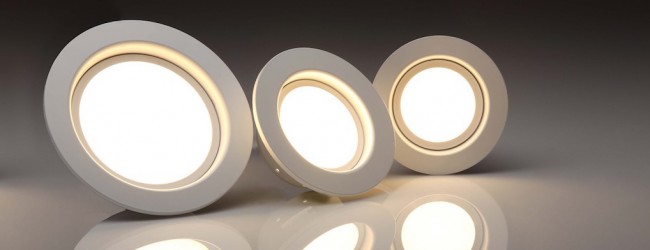LED downlights are great; they look nice, they are safe and easy to maintain, and they provide a low-cost lighting solution to our homes. This is common knowledge, but there are still people who are unaware of just how extensive these benefits really are.
Anyone in search of aesthetic enhancement for their home, or anyone looking for safe and affordable lighting in Adelaide need look no further than these handy diodes.
LEDs and the Environment
LEDs save us money and reduce carbon emissions thanks to their low appetite for electricity, but just how big are these savings? When compared to incandescent lighting – i.e. the traditional filament light bulbs you find in the home – the energy saving LED light will consume only a quarter of the energy of the traditional bulb, and in many cases far less than this.
Couple this with the startling longevity of an LED downlight – it’s estimated that a well-maintained diode could last up to 25 times as long as an incandescent bulb – and you have yourself a highly efficient, incredibly long-lasting light source which is going to save you serious money.
Keeping Safe in the Home
In 2010, the fire and rescue department of New South Wales released a chilling warning to residents. They identified halogen downlights as the cause of numerous fires between 2005 and 2010, resulting in millions of dollars’ worth of property damage, injury, illness and even death. The statement from Fire and Rescue NSW explained how the temperature generated by a halogen bulb can reach temperatures as high as 370C, creating a highly dangerous situation in the home.
LED lights – on the other hand – are safe for use in the home, as they release only a minimal amount of their electrical energy as heat. This also makes them incredibly efficient. In contrast, a traditional filament bulb will release 90% of its energy as heat energy, while even a compact fluorescent light will lose 80% of its energy in this manner. Nasty burns, property damage, and even potentially lethal fires can be avoided by using LEDs.
Offsetting the Costs
LED installation should only ever be handled by a qualified domestic electrician. The safety and energy-saving benefits mentioned above simply cannot be achieved if the lights are installed by an amateur. Doing so may invalidate product warranties and jeopardise safety. Carrying out commercial electrical services without a license is illegal in South Australia.
With this in mind, it simply is not worth trying to cut corners and reduce initial outlay by avoiding paying for LED installation. Instead, look to recoup the installation costs over a longer period of time through the savings you will make on your monthly energy bills. With a 75% increase in energy efficiency as a minimum standard, it will not take long for the LED lights to pay for themselves.
Some Tips
By deploying your lights in the right way, you can enhance their efficiency and boost the savings you make.
- Think about using a dimming mechanism which will enable you to control the intensity of your LED lights. This can translate to major savings over time.
- Plan the deployment of your lights carefully. Placing LED downlights in the corners of a room or in any position where they may become obstructed will be a waste and will result in a poorly lit room.
- When installing LED downlights, think about even distribution with lower power. If you are lighting a larger space, don’t be tempted to install fewer sets of higher powered LEDs. This will not effectively light the space and will provide less substantial energy savings. Instead, select lower power lights and distribute them evenly throughout the space.
Want to find out more about how LED downlights can benefit your home? Get in touch with one of the experts at TPR Electrical today or make an online booking!
REFERENCES
http://energy.gov/energysaver/led-lighting
https://www.allianz.com.au/home-insurance/news/choosing-light-bulbs-for-the-home
http://www.fire.nsw.gov.au/page.php?id=709
https://www.sa.gov.au/topics/business-industry-and-trade/licensing/occupations-and-trades/licensing

 1300 877 353
1300 877 353
 Email
Email
